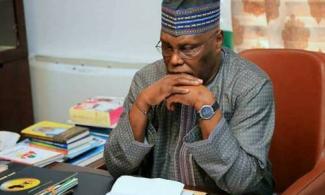
The Supreme Court of Nigeria on Thursday said that Atiku Abubakar was unable to prove that he secured a higher number of votes than President Bola Tinubu in the 2023 presidential election.
The apex court said this as it ruled in favour of President Tinubu in the appeal filed by Atiku challenging the judgment of the Presidential Election Petition Court which had dismissed his petition challenging Tinubu’s election.
Delivering judgment on Atiku’s appeal, the presiding justice of the panel, John Okoro, said that there was nowhere in the appeal that the appellant indicated a particular number of votes he scored in the election to counter Tinubu’s score and prove that his score was not fully allocated to him.
The Supreme Court upheld the election petition court’s judgment where it stated that “the table referred to by the petitioners is the table of results declared by the first respondent. There is no other set of results placed before this court by the petitioners to form the basis of our finding or the fact as to whether the declared results are wrong or not”.
It said, "success or failure in an election depends on figures which is in turn depending on votes garnered by each candidate.
"So, where the complaint in an election petition is that the candidate returned did not poll the majority of the highest votes in the election, as contended here by the petitioners, not only must the figure disputed be pleaded, the figures or votes the petitioner perceives as correct figures of the election ought to and must be pleaded."
The Supreme Court further upheld the election petition court decision which stated that "Section 134(2) of the 1999 Constitution talks of the highest number of votes cast at the election if the contest was among more than two candidates as in the instance case, not majority of votes cast as propounded by the petitioners.
"The first respondent was therefore right from the results declared by her in the absence of any rival or alternative results placed before this court by the petitioners; that the second respondent who scored 8,794,726 votes as against 6,984,225 votes scored by the petitioners in the election, scored the highest number of lawful votes cast in the election."
Justice Okoro therefore said that the ruling of the election petition court "represents the correct position of the law and I wholly endorse same."
The Independent National Electoral Commission (INEC) on March 1 declared Tinubu of the ruling All Progressives Congress (APC) as the president-elect amid protests by the Labour Party and the PDP and calls from various quarters that the results of the elections should be cancelled because of alleged irregularities concerning the Bimodal Voters Accreditation System (BVAS).
According to the commission, Tinubu, a former Lagos State governor, polled a total of 8,794,726 votes to defeat his closest challengers, Atiku who scored a total of 6,984,520 votes and Peter Obi of the Labour Party (LP) who scored a total of 6,101,533 votes.
Justice Okoro further stated that on the contention that the first respondent's averment that the appellant won 21 states out of the 36 states of the Federation, thus constituting an admission against interest, the position of the law is well settled, having regard to who can be declared winner of a presidential election in Nigeria.
According to him, Section 134(2) of the 1999 Constitution makes it explicit that "a candidate for an election to the office of President shall be deemed to have been duly elected where there be more than two candidates of the election (a) he has the highest number of votes cast at the election (b) he has the highest votes in the election at least ⅔ of all the states in the federation and the Federal Capital Territory, Abuja."
The Judge said, "In this appeal, the issue before us is not who among the candidates won in the majority of the states of the Federation which is debatable, but who scored the highest number of votes at the election.
"I have strenuously combed through the respective briefs of the parties viz a viz the record of appeal, I am unable to find any alternative figure put forward by the appellants as their rightful votes scored in the election other than the scores presented by the first respondent, INEC, showing that the second respondent scored the highest number of votes.
"It is presumed correct. It is clear that the appellants having not put forward their perceived rightful score to rebute the results put forward by the INEC, the law presumed the first respondent as correct.
"It would not matter whether the appellants can prove having won more state or if the first respondent admits that much. The figures before us show that the second respondent won the highest number of votes and was accordingly returned elected.
"From whence therefore would we manufacture evidence to support the appellants' claim that they scored the majority of lawful votes cast at the election or that there was noncompliance with the Electoral Act which affected the credibility of the election?
"Nowhere, definitely, not from the evidence on the record and that is why this issue is resolved against the appellants."